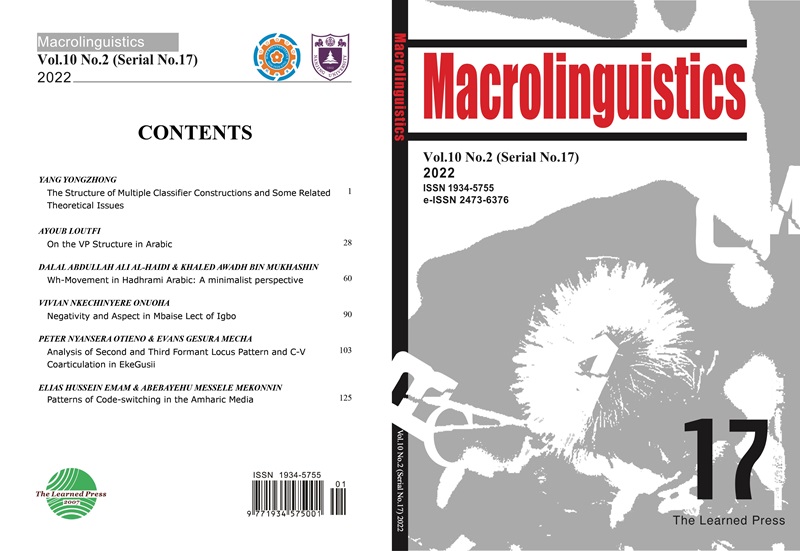英语和摩洛哥阿拉伯语条件句的对比分析:摩洛哥英语学习者在学习英语条件句时可能遇到的问题
引用次数: 0
摘要
学习用一门新语言处理假设情境总是很困难的(Catford, et al., 1974)。这条规则适用于说摩洛哥阿拉伯语(以下简称MA)的人学习英语,因为这两种语言的语法手段在几乎所有相同的情况下都是不同的。例如,英语动词形式在条件句中用来表示时态,而MA用它们来表示方面。本研究采用Dancygier(1999)和Dancygier & Sweetser(2005)提出的条件句类型,对英语和MA中的条件句进行对比分析,以预测EFL/ESL学习者在学习英语时可能犯的错误。分析表明,英语条件句与汉语条件句的主要差异在于两种语言系统所使用的动词形式。因此,如果EFL/ESL学习者在他们的母语中受到动词形式的影响,他们在学习英语条件句时可能会面临一些挑战。也就是说,他们很可能在英语预测条件句和一般条件句的蛋白酶中使用过去时,因为在MA中这两种类型的蛋白酶中都使用了动词的完成形式。对于英语非谓语条件句的蛋白酶,摩洛哥的EFL/ESL学习者既可能使用过去时,也可能使用现在时,因为在MA非谓语条件句的蛋白酶中,动词的完成时和不完成时都可能出现。然而,由于完成时是英语条件句蛋白酶的原型形式,因此英语条件句的英语学习者可能更多地使用过去时,因为英语条件句的条件句中普遍使用的是不完成时。本文章由计算机程序翻译,如有差异,请以英文原文为准。
A Contrastive Analysis of Conditionals in English and Moroccan Arabic: Potential problems when learning English conditionals by Moroccan EFL learners
: Learning to handle hypothetical situations in a new language is always difficult (Catford, et al., 1974). This rule holds true for Moroccan Arabic (henceforth MA) speakers learning English because grammatical devices in the two languages differ in almost all equivalent situations. For instance, while English verb forms are used to indicate tense in conditional sentences, MA uses them to indicate aspect. Adopting the typology of conditional constructions suggested by Dancygier (1999) and Dancygier & Sweetser (2005), this study provides a contrastive analysis of conditionals in English and MA to predict the possible errors EFL/ESL learners are likely to make while learning English. The analysis shows that the main discrepancy between English conditionals and MA conditionals lies in the verb form used by the two systems. Accordingly, if EFL/ESL learners are influenced by verb form in their L1, they are likely to face some challenges while learning English conditionals. That is, they are likely to use the past tense in the protases of English predictive conditionals and generic conditionals since the perfective form of the verb is used in the protases of these two types in MA. Concerning the protases of English non-predictive conditionals, Moroccan EFL/ESL learners are likely to use either the past tense or the present tense since both the perfective and the imperfective forms of the verb are possible in the protases of MA non-predictive conditionals. However, due to the fact that the perfective form is the prototypical form in the protases of conditionals in MA, EFL/ESL learners are likely to use the past tense more EFL learners apodoses of English conditionals since the prevalent form in the apodoses of MA conditionals is the imperfective.
求助全文
通过发布文献求助,成功后即可免费获取论文全文。
去求助
来源期刊
自引率
0.00%
发文量
83
审稿时长
20 weeks
期刊介绍:
Macrolinguistics (ISSN 1934-5755, e-ISSN 2473-6376) is an international academic journal which is specialized in research papers of non-Indo-European linguistics. It is published biannually by The Learned Press and funded by the Double First-Class Initiative of Nanjing University. It aims at contributing to the complementarity and interaction of linguistic research worldwide.

 求助内容:
求助内容: 应助结果提醒方式:
应助结果提醒方式:


